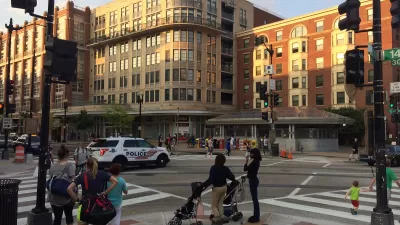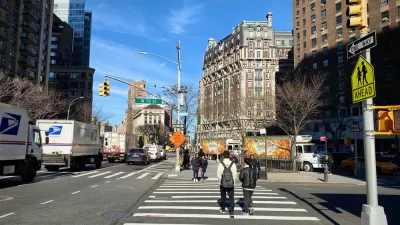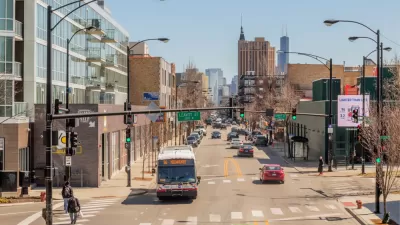Republicans and the American Civil Liberties Union back bills to ban red light and speed cameras in Iowa, while Democrats and law enforcement want to allow cities and counties to retain automated traffic-enforcement tools.

"House Study Bill 512 would void local ordinances authorizing the use of traffic cameras as of July 1 and order their removal in eight cities and one county where they are used," writes James Q. Lynch, political reporter for The Gazette (Cedar Rapids, IA), on Jan. 17.
The use of the cameras may have been well-intentioned, said Daniel Zeno of the ACLU of Iowa, “but we don’t have to give up due process for safety. We can have both."
Opposition to traffic cameras by the American Civil Liberties Union dates back almost 20 years, and is based what they perceive to be a lack of "due process," as Zeno notes.
"There are two issues of fundamental fairness with the cameras that affect the right to due process under the law," according to an ACLU press release dated August 23, 2001.
First, the tickets are sent to the owner of a car, who was not necessarily the person committing the alleged violation. The burden of proof usually then falls on the owner to prove he or she was not driving at the time. This is a violation of the bedrock American principle that the accused be considered innocent until proven guilty.
Second, many red-light camera systems have been installed under contracts that deliver a cut of ticket revenue to the contractor. That creates an obvious incentive to contractors to "game" the system in order to increase revenue...
"Rep. Brian Meyer, D-Des Moines, who was on that city’s council when traffic cameras were installed there, defended their use and said the process for people to contest their citations protects due process," adds Lynch.
“In this bizarro world, Democrats will stand with the police and Republicans are standing with the ACLU,” he said.
It seems like controversy follows traffic cameras, also called automated traffic enforcement. Lynch reports on an ongoing lawsuit and ans Iowa Department of Transportation administrative order that Sioux City, the state's fourth largest city, must deal with to retain its red light and speed cameras. As the ACLU noted above, much opposition stems from the perception that the cameras are more cash cows for local government than legitimate safety tools aiding law enforcement with limited budgets.
HSB 512 was approved by the subcommittee on Wednesday as was a companion bill, Senate Study Bill 3025, over opposition from cities and law enforcement agencies on Thursday, reports Lynch for The Gazette.
“This is an important tool for law enforcement,” lobbyist Gary Grant, representing Cedar Rapids, told the subcommittee. “As we move forward with technology, as law enforcement budgets get tighter and tighter, we need to give them force multipliers when they are out on the street. This is one tool among many law enforcement use to keep our streets safer.
"If HSB 512 is approved, Iowa would be the first state to enact an outright ban on traffic cameras, said David Adelman, representing the Metro Alliance of the 10 largest Iowa cities," adds Lynch.
Hat tip to AASHTO Daily Transportation Update.
FULL STORY: Iowa House panel green-lights bill to ban traffic cameras

Maui's Vacation Rental Debate Turns Ugly
Verbal attacks, misinformation campaigns and fistfights plague a high-stakes debate to convert thousands of vacation rentals into long-term housing.

Planetizen Federal Action Tracker
A weekly monitor of how Trump’s orders and actions are impacting planners and planning in America.

San Francisco Suspends Traffic Calming Amidst Record Deaths
Citing “a challenging fiscal landscape,” the city will cease the program on the heels of 42 traffic deaths, including 24 pedestrians.

Defunct Pittsburgh Power Plant to Become Residential Tower
A decommissioned steam heat plant will be redeveloped into almost 100 affordable housing units.

Trump Prompts Restructuring of Transportation Research Board in “Unprecedented Overreach”
The TRB has eliminated more than half of its committees including those focused on climate, equity, and cities.

Amtrak Rolls Out New Orleans to Alabama “Mardi Gras” Train
The new service will operate morning and evening departures between Mobile and New Orleans.
Urban Design for Planners 1: Software Tools
This six-course series explores essential urban design concepts using open source software and equips planners with the tools they need to participate fully in the urban design process.
Planning for Universal Design
Learn the tools for implementing Universal Design in planning regulations.
Heyer Gruel & Associates PA
JM Goldson LLC
Custer County Colorado
City of Camden Redevelopment Agency
City of Astoria
Transportation Research & Education Center (TREC) at Portland State University
Jefferson Parish Government
Camden Redevelopment Agency
City of Claremont





























